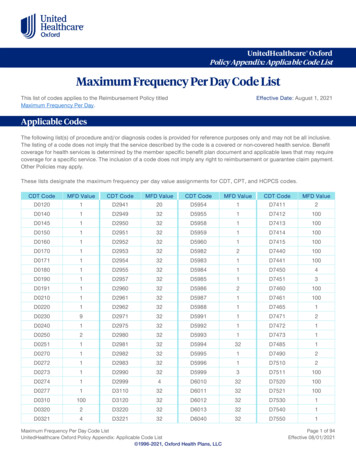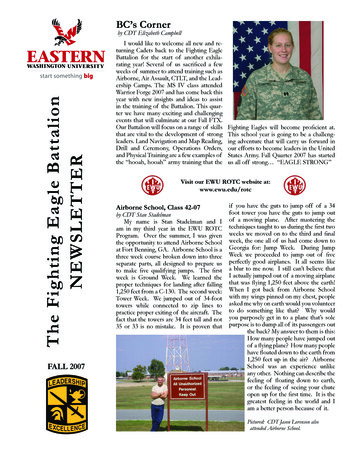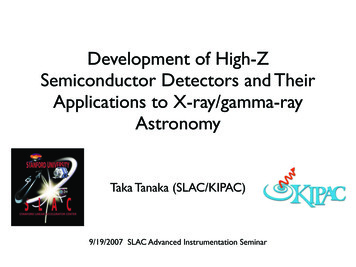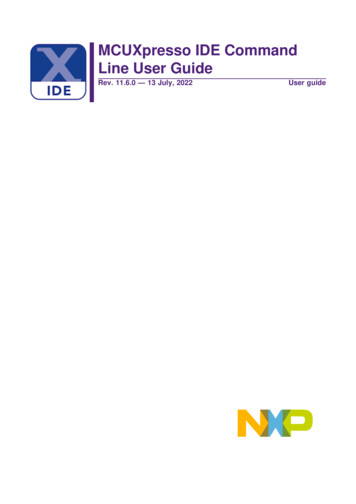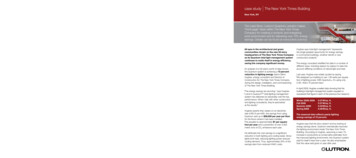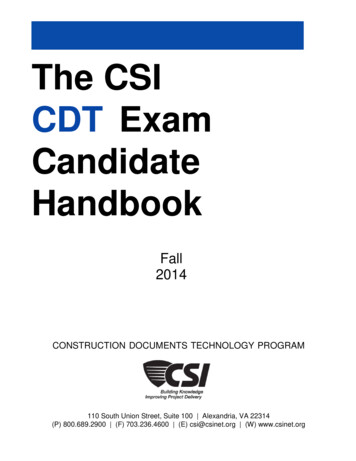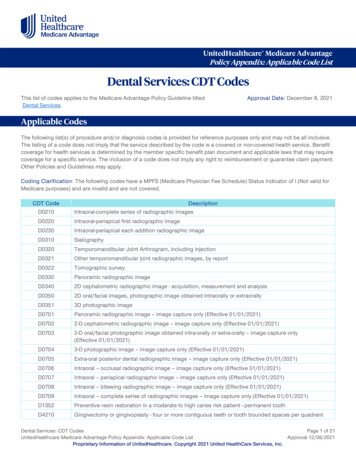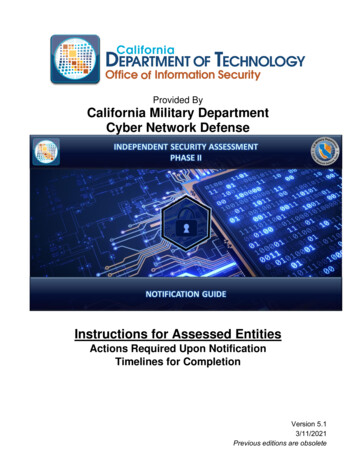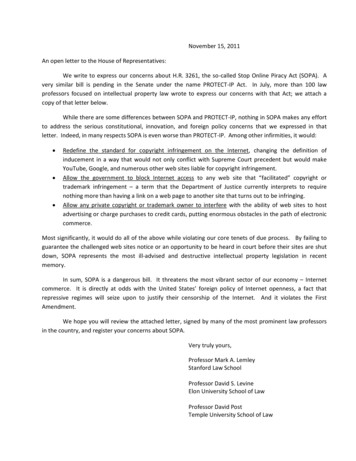
Transcription
November 15, 2011An open letter to the House of Representatives:We write to express our concerns about H.R. 3261, the so-called Stop Online Piracy Act (SOPA). Avery similar bill is pending in the Senate under the name PROTECT-IP Act. In July, more than 100 lawprofessors focused on intellectual property law wrote to express our concerns with that Act; we attach acopy of that letter below.While there are some differences between SOPA and PROTECT-IP, nothing in SOPA makes any effortto address the serious constitutional, innovation, and foreign policy concerns that we expressed in thatletter. Indeed, in many respects SOPA is even worse than PROTECT-IP. Among other infirmities, it would: Redefine the standard for copyright infringement on the Internet, changing the definition ofinducement in a way that would not only conflict with Supreme Court precedent but would makeYouTube, Google, and numerous other web sites liable for copyright infringement.Allow the government to block Internet access to any web site that “facilitated” copyright ortrademark infringement – a term that the Department of Justice currently interprets to requirenothing more than having a link on a web page to another site that turns out to be infringing.Allow any private copyright or trademark owner to interfere with the ability of web sites to hostadvertising or charge purchases to credit cards, putting enormous obstacles in the path of electroniccommerce.Most significantly, it would do all of the above while violating our core tenets of due process. By failing toguarantee the challenged web sites notice or an opportunity to be heard in court before their sites are shutdown, SOPA represents the most ill-advised and destructive intellectual property legislation in recentmemory.In sum, SOPA is a dangerous bill. It threatens the most vibrant sector of our economy – Internetcommerce. It is directly at odds with the United States’ foreign policy of Internet openness, a fact thatrepressive regimes will seize upon to justify their censorship of the Internet. And it violates the FirstAmendment.We hope you will review the attached letter, signed by many of the most prominent law professorsin the country, and register your concerns about SOPA.Very truly yours,Professor Mark A. LemleyStanford Law SchoolProfessor David S. LevineElon University School of LawProfessor David PostTemple University School of Law
Professors’ Letter in Opposition to “Preventing Real Online Threats to EconomicCreativity and Theft of Intellectual Property Act of 2011”(PROTECT-IP Act of 2011, S. 968)July 5, 2011To Members of the United States Congress:The undersigned are 110 professors from 31 states, the District of Columbia, andPuerto Rico who teach and write about intellectual property, Internet law, innovation,and the First Amendment. We strongly urge the members of Congress to reject thePROTECT-IP Act (the “Act”). Although the problems the Act attempts to address –online copyright and trademark infringement – are serious ones presenting new anddifficult enforcement challenges, the approach taken in the Act has grave constitutionalinfirmities, potentially dangerous consequences for the stability and security of theInternet's addressing system, and will undermine United States foreign policy andstrong support of free expression on the Internet around the world.The Act would allow the government to break the Internet addressing system. Itrequires Internet service providers, and operators of Internet name servers, to refuse torecognize Internet domains that a court considers “dedicated to infringing activities.”But rather than wait until a Web site is actually judged infringing before imposing theequivalent of an Internet death penalty, the Act would allow courts to order anyInternet service provider to stop recognizing the site even on a temporary restrainingorder or preliminary injunction issued the same day the complaint is filed. Courtscould issue such an order even if the owner of that domain name was never givennotice that a case against it had been filed at all.The Act goes still further. It requires credit card providers, advertisers, andsearch engines to refuse to deal with the owners of such sites. For example, search
engines are required to “(i) remove or disable access to the Internet site associated withthe domain name set forth in the court order; or (ii) not serve a hypertext link to suchInternet site.” In the case of credit card companies and advertisers, they must stopdoing business not only with sites the government has chosen to sue but any site that aprivate copyright or trademark owner claims is predominantly infringing. Giving thisenormous new power not just to the government but to any copyright and trademarkowner would not only disrupt the operations of the allegedly infringing web sitewithout a final judgment of wrongdoing, but would make it extraordinarily difficult foradvertisers and credit card companies to do business on the Internet.Remarkably, the bill applies to domain names outside the United States, even ifthey are registered not in the .com but, say, the .uk or .fr domains. It even applies tosites that have no connection with the United States at all, so long as they allegedly“harm holders” of US intellectual property rights.The proposed Act has three major problems that require its rejection:1. Suppressing speech without notice and a proper hearing: The SupremeCourt has made it abundantly clear that governmental action to suppress speech takenprior to “a prompt final judicial decision . . . in an adversary proceeding” that the speech isunlawful is a presumptively unconstitutional “prior restraint,”1 the “most serious and1Freedman v. Maryland, 380 U.S. 51, 58-60 (U.S. 1965) (statute requiring theater owner to receive alicense before exhibiting allegedly obscene film was unconstitutional because the statute did not“assure a prompt final judicial decision” that the film was obscene); see also Bantam Books v. Sullivan,372 U.S. 58 (1962) (State Commission’s letters suggesting removal of books already in circulation is a“prior administrative restraint” and unconstitutional because there was no procedure for “an almostimmediate judicial determination of the validity of the restraint”); Fort Wayne Books, Inc. v. Indiana,489 U.S. 46, 51-63 (1989) (procedure allowing courts to order pre-trial seizure of allegedly obscene filmsbased upon a finding of probable cause was an unconstitutional prior restraint; publications “may not betaken out of circulation completely until there has been a determination of [unlawful speech] after anadversary hearing.”). See also Center For Democracy & Technology v. Pappert, 337 F. Supp. 2d 606, 651(E.D. Pa. 2004) (statute blocking access to particular domain names and IP addresses an unconstitutionalprior restraint).
the least tolerable infringement on First Amendment rights,”2 permissible only in thenarrowest range of circumstances. The Constitution “require[s] a court, before materialis completely removed from circulation, . . . to make a final determination that material is[unlawful] after an adversary hearing.”3The Act fails this Constitutional test. It authorizes courts to take websites “out ofcirculation” – to make them unreachable by and invisible to Internet users in the UnitedStates and abroad -- immediately upon application by the Attorney General after an exparte hearing. No provision is made for any review of a judge’s ex parte determination,let alone for a “prompt and final judicial determination, after an adversary proceeding,”that the website in question contains unlawful material. This falls far short of what theConstitution requires before speech can be eliminated from public circulation. 42. Breaking the Internet’s infrastructure: If the government uses the power todemand that individual Internet service providers make individual, country-specificdecisions about who can find what on the Internet, the interconnection principle at the2Nebraska Press Ass'n v. Stuart, 427 U.S. 539, 559 (1976).CDT v. Pappert, 337 F.Supp.2d, at 657 (emphasis added).4The Act would also suppress vast amounts of protected speech containing no infringing contentwhatsoever, and is unconstitutional on that ground as well. The current architecture of the Internetpermits large numbers of independent individual websites to operate under a single domain name bythe use of unique sub-domains; indeed, many web hosting services operate hundreds or thousands ofwebsites under a single domain name (e.g., www.aol.com, www.terra.es, www.blogspot.com). Byrequiring suppression of all sub-domains associated with a single offending domain name, the Act“burns down the house to roast the pig,” ACLU v. Reno, 521 U.S. 844, 882 (1997), failing thefundamental requirement imposed by the First Amendment that it implement the “least restrictivemeans of advancing a compelling state interest.” ACLU v. Ashcroft, 322 F.3d 240, 251 (3d Cir. 2003)(quoting Sable Commun. v. FCC, 492 U.S. at 126 (emphasis added)); cf. O’Brien, 391 U.S. at 377 (even thelower “intermediate scrutiny” standard requires that any “incidental restriction on First Amendmentfreedoms . . . be no greater than is essential to the furtherance of that interest”); see also CDT v Pappert,337 F.Supp.2d, at 649 (domain name blocking *“DNS filtering” resulted in unconstitutional“overblocking” of protected speech whenever “the method is used to block a web site on an onlinecommunity or a Web Hosting Service, or a web host that hosts web sites as sub-pages under a singledomain name,” and noting that one service provider “blocked hundreds of thousands of web sitesunrelated to” the targeted unlawful conduct); see also id., at 640 (statute resulted in blocking fewerthan 400 websites containing unlawful child pornography but in excess of one million websites withoutany unlawful material).3
very heart of the Internet is at risk. The Internet’s Domain Name System (“DNS”) is afoundational building block upon which the Internet has been built and on which itscontinued functioning critically depends. The Act will have potentially catastrophicconsequences for the stability and security of the DNS. By authorizing courts to orderthe removal or replacement of database entries from domain name servers and domainname registries, the Act undermines the principle of domain name universality – that alldomain name servers, wherever they may be located on the network, will return thesame answer when queried with respect to the Internet address of any specific domainname – on which countless numbers of Internet applications, at present, are based.Even more troubling, the Act will critically subvert efforts currently underway – andstrongly supported by the U.S. government – to build more robust security protectionsinto the DNS protocols; in the words of a number of leading technology experts, severalof whom have been intimately involved in the creation and continued evolution of theDNS for decades:The DNS is central to the operation, usability, and scalability of the Internet;almost every other protocol relies on DNS resolution to operate correctly. It isamong a handful of protocols that that are the core upon which the Internet isbuilt. . . . Mandated DNS filtering [as authorized by the Act] would be minimallyeffective and would present technical challenges that could frustrate importantsecurity initiatives. Additionally, it would promote development of techniquesand software that circumvent use of the DNS. These actions would threaten theDNS’s ability to provide universal naming, a primary source of the Internet’svalue as a single, unified, global communications network. . . . PROTECT IP’sDNS filtering will be evaded through trivial and often automated changesthrough easily accessible and installed software plugins. Given this strongpotential for evasion, the long-term benefits of using mandated DNS filtering tocombat infringement seem modest at best.55Crocker, et al., “Security and Other Technical Concerns Raised by the DNS Filtering Requirements in thePROTECT IP Bill,” available at hitepaperFinal.pdf. The authors describe in detail how implementation of the Act’s mandatory DNS filteringscheme will conflict with and undermine development of the “DNS Security Extensions,” a “critical set of
Moreover, the practical effect of the Act would be to kill innovation by newtechnology companies in the media space. Anyone who starts such a company is at riskof having their source of customers and revenue – indeed, their website itself -disappear at a moment’s notice. The Act’s draconian obligations foisted on Internetservice providers, financial services firms, advertisers, and search engines, which willhave to consult an ever-growing list of prohibited sites they are not allowed to connectto or do business with, will further hamper the Internet’s operations and effectiveness.3. Undermining United States’ leadership in supporting and defending freespeech and the free exchange of information on the Internet: The Act represents aretreat from the United States’ strong support of freedom of expression and the freeexchange of information and ideas on the Internet. At a time when many foreigngovernments have dramatically stepped up their efforts to censor Internetcommunications,6 the Act would incorporate into U.S. law – for the first time – asecurity updates” for the DNS under development (with the strong support of both the U.S. governmentand private industry) since the mid-1990s.6Secretary of State Clinton, in her “Remarks on Internet Freedom” delivered earlier this year, put it thisway:In the last year, we’ve seen a spike in threats to the free flow of information. China, Tunisia, andUzbekistan have stepped up their censorship of the internet. In Vietnam, access to popularsocial networking sites has suddenly disappeared. And last Friday in Egypt, 30 bloggers andactivists were detained. . . . As I speak to you today, government censors somewhere areworking furiously to erase my words from the records of history. But history itself has alreadycondemned these tactics.[T]he new iconic infrastructure of our age is the Internet. Instead of division, it stands forconnection. But even as networks spread to nations around the globe, virtual walls are croppingup in place of visible walls. . . . Some countries have erected electronic barriers that preventtheir people from accessing portions of the world’s networks. They’ve expunged words, names,and phrases from search engine results. They have violated the privacy of citizens who engage innon-violent political speech. . . . With the spread of these restrictive practices, a newinformation curtain is descending across much of the world.
principle more closely associated with those repressive regimes: a right to insist on theremoval of content from the global Internet, regardless of where it may have originatedor be located, in service of the exigencies of domestic law. China, for example, has(justly) been criticized for blocking free access to the Internet with its Great Firewall.But even China doesn't demand that search engines outside China refuse to index orlink to other Web sites outside China. The Act does just that.The United States has been the world’s leader, not just in word but in deed, incodifying these principles of speech and exchange of information. Requiring Internetservice providers, website operators, search engine providers, credit card companiesand other financial intermediaries, and Internet advertisers to block access to websitesbecause of their content would constitute a dramatic retreat from the United States’long-standing policy, implemented in section 230 of the Communications Decency Act,section 512 of the Copyright Act, and elsewhere, of allowing Internet intermediaries tofocus on empowering communications by and among users, free from the need tomonitor, supervise, or play any other gatekeeping or policing role with respect to thosecommunications. These laws represent the hallmark of United States leadership indefending speech and their protections are significantly responsible for making theInternet into the revolutionary communications medium that it is today. They reflect apolicy that has not only helped make the United States the world leader in a wide rangeof Internet-related industries, but it has also enabled the Internet's uniquelydecentralized structure to serve as a global platform for innovation, speech,collaboration, civic engagement, and economic growth. The Act would undermine thatleadership and dramatically diminish the Internet’s capability to be a functioningcommunications medium. In conclusion, passage of the Act will compromise ourability to defend the principle of the single global Internet – the Internet that looks the
same to, and allows free and unfettered communication between, users located inBoston and Bucharest, free of locally-imposed censorship regimes.As such, it mayrepresent the biggest threat to the Internet in its history.While copyright infringement on the Internet is a very real problem, copyrightowners already have an ample array of tools at their disposal to deal with the problem.We shouldn’t add the power to break the Internet to that list.Signed,7Professor John R. AllisonMcCombs School of BusinessUniversity of Texas at AustinProfessor Brook K. BakerNortheastern University School of LawProfessor Derek E. BambauerBrooklyn Law SchoolProfessor Margreth BarrettHastings College of LawUniversity of California-San FranciscoProfessor Mark BartholomewUniversity at Buffalo Law SchoolProfessor Ann M. BartowPace Law SchoolProfessor Marsha BaumUniversity of New Mexico School of LawProfessor Yochai BenklerHarvard Law School7All institutions are listed for identification purposes only.
Professor Oren BrachaUniversity of Texas School of LawProfessor Annemarie BridyUniversity of Idaho College of LawProfessor Dan L. BurkUniversity of California-Irvine School of LawProfessor Irene CalboliMarquette University School of LawProfessor Adam CandeubMichigan State University College of LawProfessor Michael CarrierRutgers Law School – CamdenProfessor Michael W. CarrollWashington College of LawAmerican UniversityProfessor Brian W. CarverSchool of InformationUniversity of California-BerkeleyProfessor Anupam ChanderUniversity of California-Davis School of LawProfessor Andrew ChinUniversity of North Carolina School of LawProfessor Ralph D. CliffordUniversity of Massachusetts School of LawProfessor Julie E. CohenGeorgetown University Law CenterProfessor G. Marcus ColeStanford Law School
Professor Kevin CollinsWashington University-St. Louis School of LawProfessor Danielle M. ConwayUniversity of Hawai’i Richardson School of LawProfessor Dennis S. CorgillSt. Thomas University School of LawProfessor Christopher A. CotropiaUniversity of Richmond School of LawProfessor Thomas CotterUniversity of Minnesota School of LawProfessor Julie Cromer YoungThomas Jefferson School of LawProfessor Ben DepoorterHastings College of LawUniversity of California – San FranciscoProfessor Eric B. EastonUniversity of Baltimore School of LawAnthony FalzoneDirector, Fair Use ProjectStanford Law SchoolProfessor Nita FarahanyVanderbilt Law SchoolProfessor Thomas G. Field, Jr.University of New Hampshire School of LawProfessor Sean FlynnWashington College of LawAmerican University
Professor Brett M. FrischmannCardozo Law SchoolYeshiva UniversityProfessor Jeanne C. FromerFordham Law SchoolProfessor William T. GallagherGolden Gate University School of LawProfessor Laura N. GasawayUniversity of North Carolina School of LawProfessor Deborah GerhardtUniversity of North Carolina School of LawProfessor Llew GibbonsUniversity of Toledo College of LawProfessor Eric GoldmanSanta Clara University School of LawProfessor Marc GreenbergGolden Gate University School of LawProfessor James GrimmelmanNew York Law SchoolProfessor Leah Chan GrinvaldSt. Louis University School of LawProfessor Richard GrunerJohn Marshall Law SchoolProfessor Bronwyn H. HallHaas School of BusinessUniversity of California at Berkeley
Professor Robert A. HeverlyAlbany Law SchoolUnion UniversityProfessor Laura A. HeymannMarshall-Wythe School of LawCollege of William & MaryProfessor Herbert HovenkampUniversity of Iowa College of LawProfessor Dan HunterNew York Law SchoolProfessor David R. JohnsonNew York Law SchoolProfessor Faye E. JonesFlorida State University College of LawProfessor Amy KapczynskiUniversity of California-Berkeley Law SchoolProfessor Dennis S. KarjalaArizona State University College of LawProfessor Anne KlinefelterUniversity of North Carolina College of LawProfessor Mary LaFranceWilliam Boyd Law SchoolUniversity of Nevada – Las VegasProfessor Amy L. LandersMcGeorge Law SchoolUniversity of the PacificProfessor Mark LemleyStanford Law School
Professor Lawrence LessigHarvard Law SchoolProfessor David S. LevineElon University School of LawProfessor Yvette Joy LiebesmanSt. Louis University School of LawProfessor Peter LinzerUniversity of Houston Law CenterProfessor Lydia Pallas LorenLewis & Clark Law SchoolProfessor Michael J. MadisonUniversity of Pittsburgh School of LawProfessor Gregory P. MagarianWashington University-St. Louis School of LawProfessor Phil MaloneHarvard Law SchoolProfessor Christian E. MammenHastings College of LawUniversity of California-San FranciscoProfessor Jonathan MasurUniversity of Chicago Law SchoolProfessor Andrea MatwyshynWharton School of BusinessUniversity of PennsylvaniaProfessor J. Thomas McCarthyUniversity of San Francisco School of LawProfessor William McGeveranUniversity of Minnesota Law School
Professor Stephen McJohnSuffolk University Law SchoolProfessor Mark P. McKennaNotre Dame Law SchoolProfessor Hiram Melendez-JuarbeUniversity of Puerto Rico School of LawProfessor Viva MoffatUniversity of Denver College of LawProfessor Ira NathensonSt. Thomas University School of LawProfessor Tyler T. OchoaSanta Clara University School of LawProfessor David S. OlsonBoston College Law SchoolProfessor Barak Y. OrbachUniversity of Arizona College of LawProfessor Kristen OsengaUniversity of Richmond School of LawProfessor Frank PasqualeSeton Hall Law SchoolProfessor Aaron PerzanowskiWayne State University Law SchoolMalla PollackCo-author, Callman on Trademarks, Unfair Competition, and MonopoliesProfessor David G. PostTemple University School of LawProfessor Connie Davis Powell
Baylor University School of LawProfessor Margaret Jane RadinUniversity of Michigan Law SchoolProfessor Glenn ReynoldsUniversity of Tennessee Law SchoolProfessor David A. RiceRoger Williams University School of LawProfessor Neil RichardsWashington University-St. Louis School of LawProfessor Michael RischVillanova Law SchoolProfessor Betsy RosenblattWhittier Law SchoolProfessor Matthew SagLoyola University-Chicago School of LawProfessor Pamela SamuelsonUniversity of California-Berkeley Law SchoolProfessor Sharon K. SandeenHamline University School of LawProfessor Jason M. SchultzUC Berkeley Law SchoolProfessor Jeremy SheffSt. John’s University School of LawProfessor Jessica SilbeySuffolk University Law SchoolProfessor Brenda M. SimonThomas Jefferson School of Law
Professor David E. SorkinJohn Marshall Law SchoolProfessor Christopher Jon SprigmanUniversity of Virginia School of LawProfessor Katherine J. StrandburgNYU Law SchoolProfessor Madhavi SunderUniversity of California-Davis School of LawProfessor Rebecca TushnetGeorgetown University Law CenterProfessor Deborah TusseyOklahoma City University School of LawProfessor Barbara van SchewickStanford Law SchoolProfessor Eugene VolokhUCLA School of LawProfessor Sarah K. WiantWilliam & Mary Law SchoolProfessor Darryl C. WilsonStetson University College of LawProfessor Jane K. WinnUniversity of Washington School of LawProfessor Peter K. YuDrake University Law SchoolProfessor Tim ZickWilliam & Mary Law
We hope you will review the attached letter, signed by many of the most prominent law professors in the country, and register your concerns about SOPA. Very truly yours, Professor Mark A. Lemley Stanford Law School Professor David S. Levine Elon University School of Law Professor David Post Temple University School of Law
